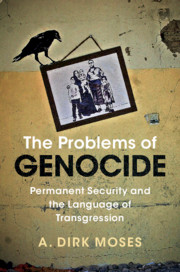Book contents
- The Problems of Genocide
- Human Rights in History
- The Problems of Genocide
- Copyright page
- Contents
- Preface
- Introduction
- Part I The Language of Transgression
- Part II Permanent Security
- 6 Permanent Security in History
- 7 The Nazi Empire as Illiberal Permanent Security
- 8 Human Rights, Population “Transfer,” and the Foundation of the Postwar Order
- 9 Imagining Nation-Security in South Asia and Palestine
- Part III The Language of Transgression, Permanent Security, and Holocaust Memory
- Index
6 - Permanent Security in History
Empire and Settler Colonialism
from Part II - Permanent Security
Published online by Cambridge University Press: 07 January 2021
- The Problems of Genocide
- Human Rights in History
- The Problems of Genocide
- Copyright page
- Contents
- Preface
- Introduction
- Part I The Language of Transgression
- Part II Permanent Security
- 6 Permanent Security in History
- 7 The Nazi Empire as Illiberal Permanent Security
- 8 Human Rights, Population “Transfer,” and the Foundation of the Postwar Order
- 9 Imagining Nation-Security in South Asia and Palestine
- Part III The Language of Transgression, Permanent Security, and Holocaust Memory
- Index
Summary
Imperial formations of one kind or another have been the political form in which most humans have lived for thousands of years. Permanent security practices enabled imperial expansion and consolidation through the ages. To tease out its function since the Spanish and Portuguese conquests of the Americas in sixteenth century, it is necessary to distinguish between empires of exploitation and settler colonies. The language of transgression developed to simultaneously conceal and expose permanent security in the process of state formation and originary accumulation: first by justifying settler colonial warfare against indigenous resistance, and second by condemning the illiberal permanent security practices of imperial rivals, whether the Iberian powers in the early modern period or the fascist and communist ones in the twentieth century. Liberal permanent security in the form of settler colonialism normalized its modality of settlement, state-formation, and originary accumulation as a theodicy, a story of civilizational progress that benefitted humanity.
Keywords
- Type
- Chapter
- Information
- The Problems of GenocidePermanent Security and the Language of Transgression, pp. 243 - 276Publisher: Cambridge University PressPrint publication year: 2021



